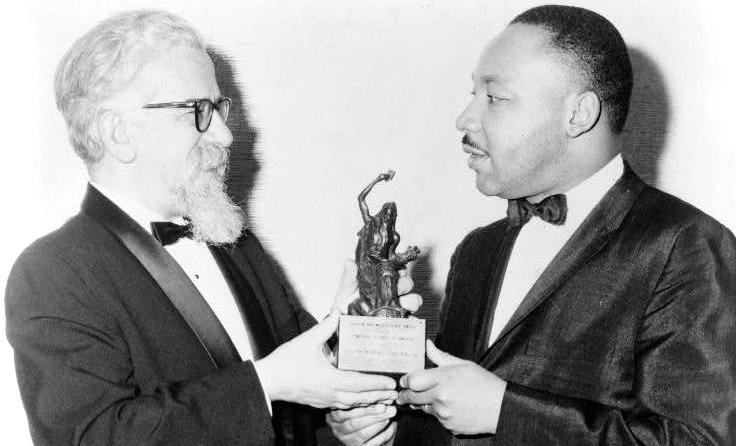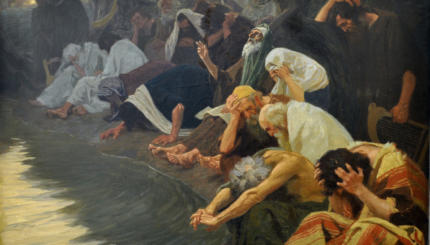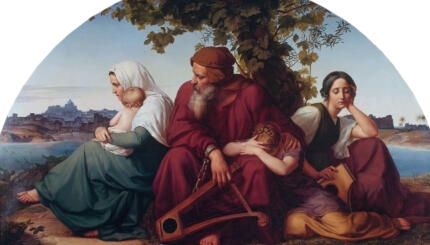Commentary on Parashat Tzav, Leviticus 6:1-8:36
When I wash myself with water I shudder, thinking:
This is the sweat of millions of laborers.”Street-walkers are my bastard sisters,
and sinister criminals–souls perhaps transmigrated from me.Concerning those murdered,
I think that I encouraged the assassin.Perhaps I insulted
the disgraced people in my town.Something in me confesses
“I’m guilty a thousand times for your distress.”I want to throw my head at your doorsteps–
Prisons, hospitals–and beg forgiveness.–Abraham Joshua Heschel
Guilt is assumed to be part and parcel of the modern Jewish experience. We laugh about our tribe’s over-developed sense of shame: There are countless jokes about guilt-inducing Jewish mothers and Woody Allen films featuring neurotic Jewish sons.
In this poem, however, guilt is no laughing matter. In scene after scene of injustice, Abraham Joshua Heschel confronts excruciating examples of personal responsibility. He seeks to confess and beg forgiveness. But to whom? And how? His guilt produces an existential anxiety that tortures him, but provides little benefit to his perceived victims.
The Guilt Offering
In Parashat Tzav, guilt feelings are transformed into actions bringing healing. The ritual of the guilt offering, asham, is straightforward. One who suspects or knows that he is guilty of wrongdoing, either by commission or omission, brings a ram without blemish to a priest at the altar.
Sections of the animal are burned and turned into smoke while other sections are set aside to be cooked and eaten by the priests (Leviticus 7:2-10). Offering this sacrifice, a person’s guilt is made publicly manifest and is then absolved.
The ancient system of sacrifice offered a ritual of coming together for the community. Rather than worry in isolation about acts committed and omitted, the individual was able to articulate the wrong and bring a symbol of contrition.
Amorphous feelings of guilt were brought out of one’s internal world and were transformed into concrete objects in a shared communal experience. While our modern sense of guilt connotes angst, “shoulds” that stay inside of us to no good purpose, the ancient guilt offering went out and away…and nourished the priests.
Of course, the ancient ways are not available to us now. Instead of offering animals in the sacrificial system, Jews offer prayers to God. Though I don’t advocate a return to Temple ritual, I can’t help feeling that something has been lost in the transition from the tangible, sensory experience of smoke, fire, and flesh to the post-Temple offerings of syllables.
Action and Advocacy
The word “sacrifice” in Hebrew is korban. Its root, k-r-v, denotes closeness and intimacy. Sacrifices, seen as a system of visceral interactions and sacred meals, didn’t just bring worshippers closer to God, they brought the community members into contact with one another. Perhaps that is what this system of sacrifice, or “getting close,” is trying to achieve: it insists that coming nearer to God means connecting more deeply with each other.
In his poem, Abraham Joshua Heschel wants to confess his guilt: “I’m guilty a thousand times for your distress.” He wrote these words in Yiddish as a student in pre-Holocaust Europe. Years later, teaching in America, Heschel moved from expressing feelings of personal guilt to a call for active response.
He writes, “It is important to feel anxiety, it is sinful to wallow in despair. What we need is a total mobilization of the heart, intelligence, and wealth for the purpose of love and justice.”
Like the young Heschel, we can witness the myriad problems on our neighborhood streets, around our city blocks and throughout the world, and see only our guilt. The model of the ancient asham encourages us to transform those interior feelings into communal acts of love and justice. Isolated, we see our inadequacy and shame. Getting closer to one another, in community action and advocacy, we approach healing.
This commentary is provided by special arrangement with American Jewish World Service. To learn more, visit www.ajws.org.

Help us keep Jewish knowledge accessible to millions of people around the world.
Your donation to My Jewish Learning fuels endless journeys of Jewish discovery. With your help, My Jewish Learning can continue to provide nonstop opportunities for learning, connection and growth.



